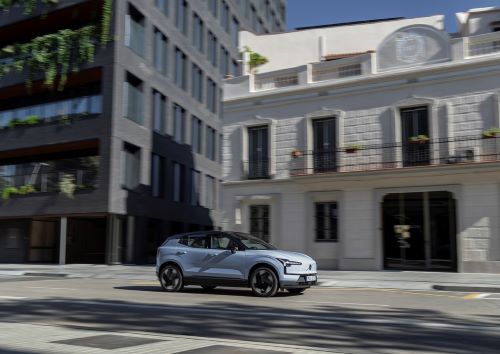
As we settle into the new year, Volvo Cars is reexamining its strategies for development and sustainability and setting new goals for the future. The company has established benchmarks to be hit by 2030 and 2040, and one to hit by 2025 as well that covers Volvo having 100% of its debt linked to its Green Financing Framework or in a sustainability-linked format.
2030 will be a milestone year for the company. By that time, Volvo Cars is shooting to:
-
Reduce its CO2 emissions per car by 75% (compared to 2018 levels).
-
Reduce energy usage in its operations per average car by 40% (compared to 2018 levels).
-
Reach 30% average recycled content across its fleet, with new car models having at least 35% recycled content.
-
Reduce water use in its operations by 50% average per car (compared to 2018 levels).
-
Either reuse or recycle at least 99% of all waste from its operations.
Additionally, Volvo aims to be a fully electric car company by 2030, helping to support its sustainable development goals on a greater level.
Volvo’s initial sustainability strategy was released in 2019, and the company has made a great deal of progress towards its targets since them. 69% of company operations are now powered by climate-neutral energy, as compared to 55% in 2019, and all of Volvo’s global manufacturing now use 100% climate-neutral electricity, as opposed to 80% in 2019. The company has already reduced its CO2 emissions per car by 19% since 2018.
Reaching these impressive achievements is a moment for the company to celebrate, and to plan to do even more in the future. Volvo Cars is now aiming to reach net zero greenhouse gas emissions by 2040. The company’s previous goal had been to achieve climate neutrality by that year, so updating the goal clarifies Volvo’s intentions to use carbon removals only to mitigate any unavoidable emissions, with reducing real emissions being a top priority. The company also aims to achieve 100% green debt or sustainability-linked financing of assets by 2025, acknowledging the critical role that finance plays in promoting sustainable development.
“Taking actions to combat climate change is non-negotiable and going fully electric is an important step on our pioneering journey,” says Jim Rowan, CEO of Volvo Cars. “As we move to further reduce emissions throughout our value chain, we have a responsibility to do more and address our biodiversity footprint as well as help improve people’s lives. Our updated strategy has been designed to help us do just that.”
Interested in learning more about the latest Volvo news updates? You can keep reading our blog here for more information!
 AdChoices
AdChoices